#expanding ATLA world
Text
Edit: Yes, the original Sokka sexism arc is great and important. But we don't live in a world where the live action show runners decided to include it in the same form. So:
Unpopular opinion time: Sokka unlearning sexism isn't actually a large part of his character arc--it literally only takes the opening episodes. And removing it COULD be a sign that the live action is taking seriously the complaints I've seen from native fans about the original show runners deciding to make the Water Tribes that sort of sexist to begin with. Sokka's actual character arc is about gaining confidence and leadership skills, and they have the opportunity to focus on that MORE if they change the Kyoshi episode to focus on Suki as a fellow teenager forced into a leadership/protective role in her community and rocking it rather than using her as an object lesson on sexism for a male character to learn from. Whether they will ACTUALLY do that is on them, but it took me less than ten minutes to think up, so I sure hope someone in the writers' room actually cares about using the live action to expand on new angles of the characters. Big ask, I know.
Now the real question is: did they also remove Uncle Iroh's unwanted physical advances on a literally paralyzed Jun, and all of Zuko's snipes about girls? Because THOSE are the actually "iffy" sexism parts in AtLA, not Sokka's five minute arc.
#avatar the last airbender#atla#Sokka#Zuko#Iroh#So help me if Iroh still gropes Jun#Our girl is looking FANTASTIC and she deserves better
4K notes
·
View notes
Text
Avatar Name Meanings!
Just for fun! Let’s take a look at the most cited meanings for ATLA names.

Aang - When his name is shown in written form, it is composed of the Chinese characters 安 (ān) meaning "peace, quiet" and 昂 (áng)meaning "raise, lift". A fitting name for an airbender who will save the world!

Katara - Taken from the Arabic word قطرة (qatra) meaning "raindrop, droplet". A gentle and poetic name for waterbender who is starting out.
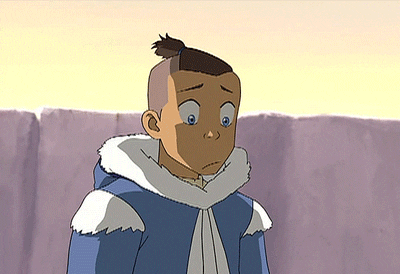
Sokka - Derived from the Japanese phrase “sou ka”, meaning "I understand" or "Is that so?". A reference to both his skeptical and analytical nature, as well as his comic relief.
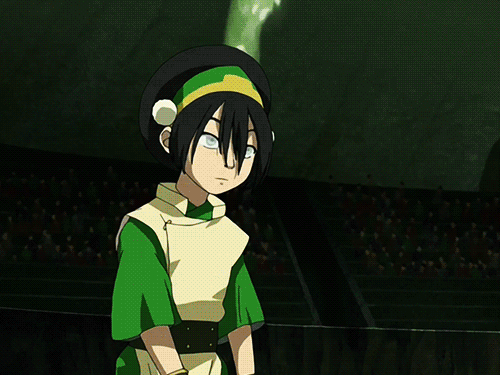
Toph - Toph was written as 北方拓芙, giving her name the meaning "expanding lotus". The name itself is not a genuine Chinese name, and may have been intended as a pun on the English word "tough". When combined with her last name Beifong, you get “lotus flower expanding northward”, a reference to Toph opening up and making friends, but also because she is from the Southern city of Gaoling and literally travels north with the Gaang.

Zuko - Fictional name written with different meanings in the show. His wanted poster uses 祖 (zǔ) from Chinese meaning "ancestor, forefather" combined with 寇 (kòu) meaning "bandit, robber". Likely meant to portray Zuko as a traitor to his family and people. However, it’s also written as 蘇 (sū) meaning "to regain consciousness" combined with 科 (kē) meaning "sort, class", which is probably the true meaning to his name referring to how Zuko will redeem the Fire Nation and royal family by redeeming himself.
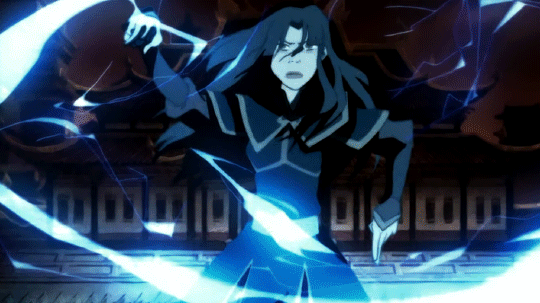
Azula - Fictional name derived from Portuguese, Galician, and Spanish azul meaning "blue" (of Persian origin). A reference to her blue flames.
Want me to cover other ATLA names? Just ask!
(Psst want more ATLA? Check this out!)
#atla#avatar the last airbender#avatar#book 4 air restoration project#Aang#Katara#Sokka#Toph#Zuko#Azula
261 notes
·
View notes
Text
💛💙SPIRK FIC REC - MY FAVOURITES💙💛
As a follow up to my recent post about how few fics make it to my favourites list, and how special they are to achieve that distinction, I decided to share my current list.
I’ve shared some of these individually in the past but here you’ll have them all together.
If you've read any of these already then I'd love to hear your thoughts on whether you loved them as much as I did! 🥰
(NB: these are not listed in any order of preference. Mostly it’s the reverse order in which I read them)
Leave No Soul Behind by whochick Words: 258,951
AOS, AU Canon-Divergence. Spock, Kirk and the other valiant members of the Emergency Personnel Ambulance Service fight to save lives and turn the tide of the ongoing war against Nero and his fleet before it’s too late. Such a beautiful slow burn for Spock and Kirk.
Atlas by distractedKat Words: 135,529
AOS. Follow on from 2009, Kirk, Spock and the rest deal with the aftermath of Nero’s attack and rebuilding after the decimation of the ‘Fleet and Academy. An exciting tale with twists and turns involving black ops, bad-mirals, action, love and fierce loyalty.
The Lotus Eaters by aldora89 Words: 93,594
AOS. Stranded on a planet together, with multiple dangers and very little hope of rescue, Jim and Spock have no choice but to rely on each other to survive. Spectacular plot, amazing world building, fabulous original character and an epic slow burn Spirk love story!
With Your Feet on the Air and Your Head on the Ground by flippyspoon Words: 39,188 @flippyspoon
SNW. A phenomenal Spirk fic in which Kirk is stuck in Spock's mind while the crew work to find a way to retrieve his body. A wonderful getting to know you/falling for you hard tale. Wonderfully written and highly entertaining.
Evolution by Rhaegal (RhaegalKS) Words: 149,293
AOS. Covering the first year of their 5 year mission, this is totally flawless. The character voices are perfection, the prose spectacular. The whole thing plays like an AOS movie. It’s phenomenal.
Emotions by LadyRa Words: 35,569
TOS. Spock gets drugged on a shore leave and is overwhelmed with its effects. Kirk tries to pick up the pieces. A beautiful, and wonderfully grounded, story of realising how much they mean to each other.
And When the Bond Breaks by LadyRa Words: 24,631
TOS. Spock takes out a shuttle to investigate an anomaly and returns to an Enterprise that’s not his own. Time travel shenanigans with such emotional depth that it will traumatise you in the best way. Stunningly good!
All Our Tomorrows Come Today by flippyspoon Words: 18,156 @flippyspoon
SNW. A newly introduced Jim and Spock accidentally get a glimpse into the future and see what they’re going to be to each other (a.k.a. Spirk’s Greatest Hits). A stunningly told story about finding the great love of your life.
I Won't Make That Mistake Again by Moreta1848 Words: 69,402 @jennelikejennay
SNW/TOS. An epic story detailing Spock and Kirk’s love throughout their lives, beginning from their meeting on Pike’s Enterprise (SNW) and continuing on to an eventual Generations fix-it happy ending. Wonderful!
No Going Back, No Before by spirkme Words: 78,486 @spirkme915
SNW/TOS. Timeline shenanigans, spies, twists & turns, pining, angst, sacrifice and so so much love!
The 1,000 Hour Sleep by spqr Words: 27,227
SNW. Jim’s been infected with a pathogen that means he can’t sleep, but it he doesn’t he’ll die. Cue Spock and his Vulcan telepathy helping Jim to achieve the sleep he needs, while they get to know each other within their shared mindscapes. A sweet and exciting story about falling in love and overcoming your own inner demons.
First Best Destiny by Ophelia_j Words: 387,733
TOS/TNG. Such a very special fic. Epic in its scope, it covers the entire timeline of Spirk from their very first meeting through to a clever and satisfying Generations fix-it ending. It provides extra scenes, additional dialogue and internal monologues to expand on existing canon in a really compelling and effective way. Truly this is my new TOS canon.
The Steadfastness of Stars by itsnatalie Words: 61,566
AOS. After Beyond, The crew investigate sudden climate change on a frozen planet and find more than they bargained for. The perfect mix of great plot, fun original characters, action, mystery, world building and deep deep love.
Let Forever Be by gunstreet Words: 43,446 @gunstreet
TOS. A really compelling character study of James T. Kirk. An excellent companion piece to City on the Edge of Forever. Exploring what Jim and Spock got up to, and all they had to overcome, while trying to find Bones and their way back home.
Time After Time by spaceisgay (ChancellorGriffin) Words: 138,921
SNW. Kirk spends a 6 month rotation on the Enterprise as part of his command training. OK, if there’s a favourite of my favourites then this may be it. It’s such a stunning version of their love story, with a beautifully constructed plot. It runs the emotional gamut from moments that will have you laughing out loud to moments that will have you in floods of tears.
milk and honey by spaceisgay (ChancellorGriffin) Words: 28,651
SNW. Kirk and Spock meet for the first time when they wake up in a prison cell together. A really fun, and extremely clever, version of the ‘aliens made them do it’ trope. It’s intriguing and funny with a real depth of feeling throughout.
The Promised Land by gunstreet Words: 58,260 @gunstreet
TOS. A story that explores the time Jim and Spock spent apart between the end of the 5 year mission and TMP. It’s a beautiful story of reunion and renewal of love. Sometimes achingly sad, but it’s worth it for the happy ending.
Again, if you've read any of these already then I'd love to hear your thoughts on whether you loved them as much as I did! 🥰
#star trek#spirk#k/s#kirk/spock#spock#james t kirk#k/s fanfic#fan fiction#fanfic#fan fic rec#star trek tos#star trek aos#star trek snw#aos spirk#tos spirk#snw spirk
456 notes
·
View notes
Text
as a lifelong ATLA fan who narrowly had ATLA dethroned as my top show by The Dragon Prince steadily over the past 5 years, the similarities between the two have very little to do with the surface level parallels that get regularly drawn between them.
Like ATLA, TDP has Books for seasons and chapters for episodes, but unlike ATLA, which only touched on storytelling sparingly as a theme, TDP is obsessed with interrogating storytelling and history and the presence of unreliable, biased narrators throughout many of its episodes (most notably 2x05, 2x06, 3x06, 4x04, and 4x07 among them). Half of what you learn in the 1x01 intro ends up being a lie once you reach S3, with more being steadily deciphered.
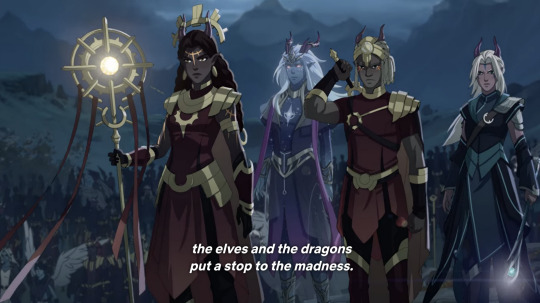
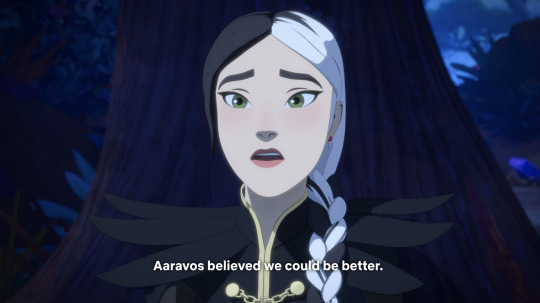
Yes, TDP has different magics with people living under those umbrella terms... for the elves. Humans are coming culturally at things from a completely different angle, and the elves' connection to their primal sources are discussed philosophically in detail, informing their practices and their culture first hand, including the way they chafe against humans, who are arcanum-less. Many animals in the world are also connected to magic, which influences both their design and which ones get hunted for humans' more 'clever' solution in dark magic, including each other.
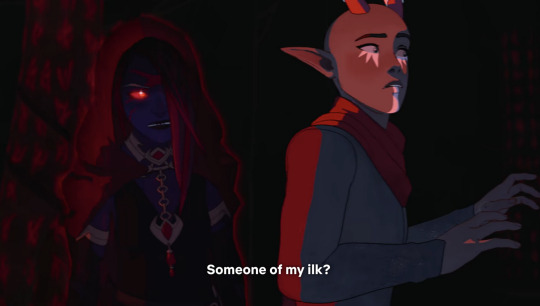
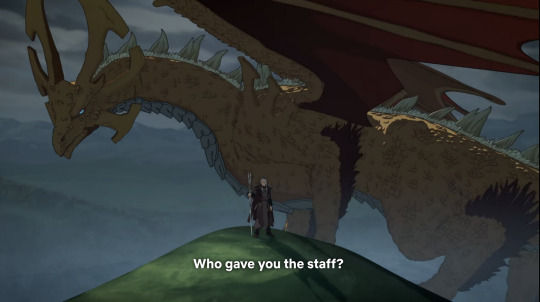
The core issue of the Puppetmaster, down to being a coercive magic formed by someone deeply resentful of their imprisonment? Said puppetmaster is the main endgame antagonist of the entire show with all of S4 onwards being exploring the ethics of controlling people against their will in various methods, and the entire show itself being a thematic battleground of fate (imprisonment) vs free will for virtually every single character.
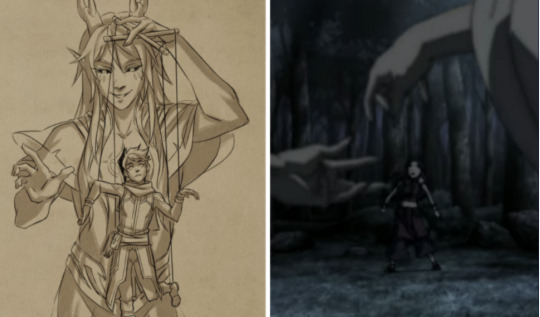
Where ATLA mostly concerns itself timeline wise with ending the war, very little thought is shown by any of the characters as to what they'll do after the war. This isn't a problem (as it reflects the sheer domineering scope of the conflict) but even Zuko being firelord is only ever really addressed with 2.5 episodes left till the finale. TDP, meanwhile, ends its 'war' in s3 and s4 opens up with dealing with the old wounds festering between people with centuries of history, the struggles that come when people aren't able to let go and believe they're safe or mourn in a healthy manner, and the religious/cultural clashes that may occur when trying to integrate different groups of people.
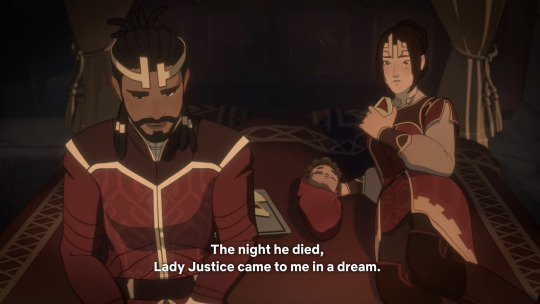
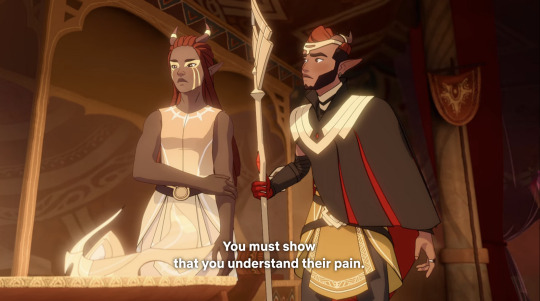
TDP also has an evil father with a devoted daughter and a brother who eventually defects, but it explores the reality of an abusive parent who loves/will sacrifice for you and your right to leave regardless, even if that means leaving the sibling you truly deeply love and who loves you in turn. Which means that when you and your sibling are on opposite sides of a deep ideological conflict, it actually really fucking hurts bc we've seen first hand just how much they love each other and also how and why everything fell apart not in spite of that love necessarily, but also because of it.
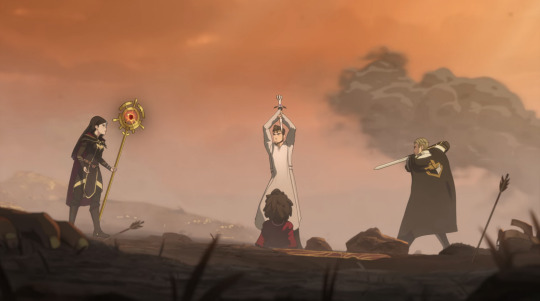
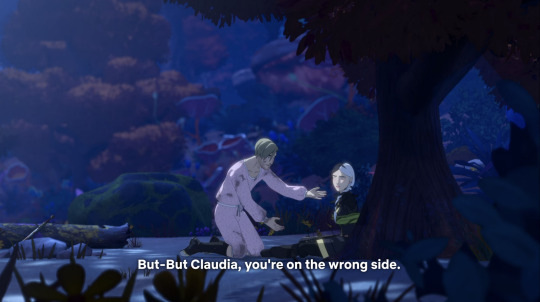
Is this to say that TDP is a 1:1 with ATLA or that it's better? No, not at all, and the latter is subjective. I prefer TDP, but I think they're about on equal ground when you look at each show currently as a whole (although TDP has two seasons left to go).
But TDP takes a lot of what ATLA was doing thematically with some of its most interesting beats and then builds or expands upon them further. It talks further and more consistently about the cycles of violence; in many ways, Jack De Sena's character, Callum, begins the series largely where Sokka had ended (and he's not the most like Sokka anyway; very much his own thing); we get Faustian bargains and centuries' long grief and fucked up people who are trying both succeeding and failing at not doing fucked up things. There are antagonists, but it is very hard to actually label anyone at this point a straight up villain. Moral greyness is where the show starts, and it just continues from there.


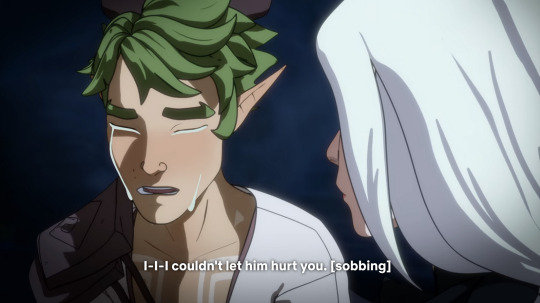
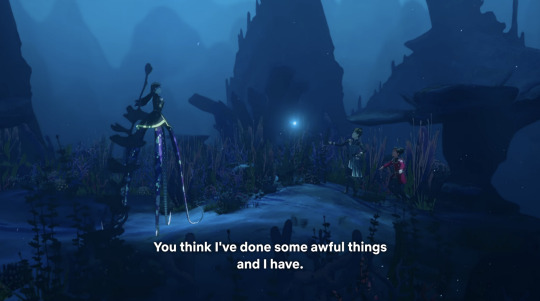
That's not to say the show is nothing but dark and depressing - like ATLA, there's a steady thread of hope and humour even as the show gets steadily closer and closer to its 11th hour point - but the show is usually emotionally heavier. There's more blood and potentially disturbing imagery with body horror and on screen death. There's so much foreshadowing you basically can't go more than 5 minutes into any episode without having something that's going to come back around or be referenced again like 3-5 seasons later.
Just to be clear - TDP is like ATLA, but it's like ATLA in interesting ways beyond the more shallow surface level that usually gets attributed to it, while still very much being its own show and its own thing. And that is why I tend to recommend it to people who like ATLA.
Thank you and goodnight
(Also, the fandom doesn't have any ship wars, and the show is queer as fuck)
#tdp#atla#the dragon prince#avatar: the last airbender#mine#parallels#analysis series#also betrayal. tdp talks a lot more about betrayal#now im trying to think if there's any character in tdp who hasn't felt or been outright betrayed#i. DON'T THINK SO??#atla meta#tdp meta
391 notes
·
View notes
Text
So I recently had the thought that Superman as depicted in the DCAU canon probably has the best-articulated-by-the-narrative and most-consistent character flaws of any Superman I’ve seen, in a way that’s enabled by the long-formedness and consistent creative vision of the series.
He’s got an Atlas complex that grinds the gears of his equally-durable, equally-capable colleagues in the Justice League. He has deep-seated fears of moving the wrong way and breaking something or someone, which is then upstream of some moderate control issues. He’s got anger problems, although it’s rare for someone to push him far enough that this takes center stage; you see this with Prof. Hamilton in the series finale of STAS, but also in a number of fights against opponents strong enough that he starts getting frustrated. When the stakes are lower, he can be cocky bordering on genuinely vindictive; there are lots of examples of him rubbing his opponents' noses in it when he finally gets them on the back foot, and it’s shown in flashbacks that he was genuinely kind of a dick when he was a teenager and hadn’t completely sorted out what proportional responses looked like. He doesn’t always think through the implications of his grand projects, be that the implicit threat-escalation posed by the expanded JLU, or the massive disarmament project he spearheaded that turned out to be part of an alien invasion scheme. There are probably more of these that I’m forgetting. The final roundup here is that he’s a good guy. He’s far and away from a perfect guy, with perfect judgement. All of this amounts to something that’s more coherent and specific than the contradictory, subject-to-eternal-revision mess you could assemble from his 60-something year publication history in the comics, but nonetheless with a substantial-enough runtime that all of these traits can be put on display again and again.
In turn, this allowed the collective DCAU continuity to get away with at least three “what if Superman went rogue” plots- four if you count the mind-control situation in Legacy- specifically because they did the legwork to establish the concrete neuroses and psychological vulnerabilities that might cause this specific version of Superman to go rogue. It was never completely insane that Luthor might figure out the exact set of words, actions, and personal losses necessary to coax this depiction of Superman into an authoritarian partnership for the supposed greater good. It’s not completely insane that this depiction of Superman, if pushed far enough, might lose faith in the collective judgement of humanity and decide to put the world and all his loved ones in a bottle. And when the Cadmus plot rolls around in JLU, it’s as effective as it is because they’ve already advanced two roads-not-taken, established what levers you need to pull to make this specific version of this guy cross the line, and that Cadmus and Luthor are pulling all of them.
I emphasize the specificity here, because the flipside of this are Superman-gone-rogue narratives that jump right to that as the cornerstone of the continuity, with no real opportunities for juxtaposition. A major issue I eventually developed with the Injustice franchise is that despite its pretenses of being an alternate universe, there’s no established continuity that it’s deviating from, bar its own. To some extent I feel as though it’s banking on the audience transposing their gestalt-understanding of Superman and the broader DCU- hell, their understanding of the Justice Lords arc in particular- in order to elide that they’re playing extremely fast-and-loose with the specifics of what has and hasn’t happened to Superman in this continuity. The DCEU is a runner-up- jumping right to the Damocles-sword of a bad-future after two movies is jumping the gun, in the same way everything about the 2010s DCEU was jumping the gun. I think you could plausibly attack TDKR’s portrayal of Superman under this logic, although I personally wouldn’t- but that’s its own post.
Point being that you can’t sell me the upset of a paradigm if you never established it-you need to set up the pins before you can bowl worth a damn.
#superman#DCAU#justice league#justice league unlimited#superman the animated series#stas#thoughts#meta
174 notes
·
View notes
Text
Adaptations neither can nor should be 1:1. They should, however, expand on something, explore a different perspective, play with the material in a meaningful way.
The tragedy about NATLA, in my opinion, is that it's simply not doing that, or at least not in a way that is actually good. It just put ATLA in a big pot, stirred it and called it a day. The tragedy is that a live action remake is simply not the best format of adaptation.
I believe that there are still things that can be expanded or explored and the world-building is rich enough to offer a lot more stories. I think they should have opted more for something like another spinoff. For easy money you could give us, either animated or live action, the story of another avatar. I'd personally love a more in depth on screen exploration of Kyoshi and the history of the Kyoshi warriors. Hell, if you want to be really creative you could use the universe and just tell a story in an entirely different genre. I'd totally watch an avatar themed spy drama or romcom or detective story. You could probably make a cabbage merchant biopic and people would love it.
208 notes
·
View notes
Text

"Back then, we were just kids. No worries of war, or of forced responsibility."
....
"I wish we knew what happened to them."
___________
me when im on the grind (have not been able to stop thinking about ATLA!submas au since i made it, and im slowly adding more and more lore as i wrap up ATLA.
I knew ATLA was good, but i have become awfully attached to the world and characters, and i am fully dreading finishing up the series.
I can't wait to expand the submas au versions though!!!
Also angst, lmao-
( picture without the burn : )
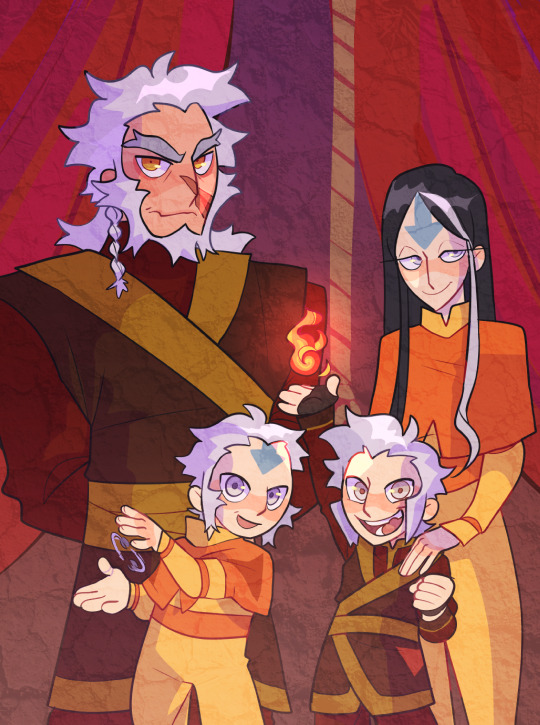
151 notes
·
View notes
Text
"The creators left due to creative differences" personally I wouldn't put much faith in Bryke given that ATLA wasn't written solely by them and the best narrative episodes were written by Ehasz and his wife–and this isn't to say they're THE reason the show was successful either. It was combined effort and ideas, esp seeing how Korra turned out (interesting concepts, unfortunately bad execution but not a terrible show overall. I hate what they did to the spirit world though).
They were most likely offered Avatar Studios which would give them more creative freedom than having to abide by Netflix restrictions, and thus decided to leave the project. Either way it gives ATLA more exposure, so why would they give up an opportunity to expand the world while also having someone else be at the helm of the live action?
if it's not obvious already I'm annoyed at how people on twt have been taking the interviews out of proportion. I would gladly nitpick the hell out of the show when it's out, but right now I've only seen a glimpse and that's not enough to make any conclusions
#avatar#avatar the last airbender#netflix avatar#avatar the last airbender netflix#atla#atla live action#aang#katara#sokka#zuko#iroh#gordon cormier#kiawentiio#ian ousley#dallas liu
298 notes
·
View notes
Text
How you end up dealing with an antagonist in a story should really depend on how you wrote that story in the first place. I really like Avatar: The Last Airbender and the Owl House, and it’s very clear that the Owl House was inspired by ATLA. However, I gotta say like… the reason why killing the villain works in TOH and not for ATLA is really the reasons why the characters do it.
Luz’s struggle is that she feels misunderstood by society, and she mistakenly connects to Belos because they’re similar people on the surface. Luz’s ideology of wanting to be a hero ends up hurting people she loves. Belos represents taking “being a hero” too far and being unable to grow, he believes he’ll be accepted by his society by killing people who are different to him and he refuses to expand his worldview. Luz ends up embracing her weirdness, and she finds that other people understand her and accept her as who she is, but also that she has to grow and learn. There’s both a metaphorical reason for killing him (literally killing the manifestation of holding onto the past/refusing to let go of the idea that you’ll be accepted if you just Kill a bunch of people), and also literally he refuses to stop, has repeatedly refused forgiveness, and is still gaslighting Luz at the very end.
Aang is a pacifist who’s been forced into violence, a little kid who wants to play and have fun but is being forced into the role of the Avatar. He doesn’t want to save the world, and he doesn’t want to kill Ozai. The point of not killing Ozai really isn’t about Ozai, it’s about Aang being able to choose his own destiny and deciding what kind of person he wants to be. Literally, also, Ozai can be stopped without killing him. He’s just a man, and killing him doesn’t really do anything good for the world. Removing him from power does.
On the other end of the spectrum, Steven Universe-
#the owl house#toh#toh spoilers#avatar the last airbender#atla spoilers#bgvbgnfb#just pretend I exploded at the end
136 notes
·
View notes
Note
If you were to expand on southern water tribe culture, what sort of traditions would the people have?
I've written a few traditions into my fics. Off the top of my head, here are a few:
All the Things That Are and Will Be
The death rites of the SWT don't involved burial in the ground. Instead a the body is washed and prepped by the family, and the body is laid to rest under stones piled around and over top the body. The ceremony involves a song commemorating the deceased for becoming one of the ancestors.
Traditional
To mark engagements in the SWT, the potential husband presents his intended with tools and supplies that will be useful to her in married life. This is usually sewing needles, knives, beads and furs, but the intended bride is allowed to make special requests. For Katara, this included fancy pens, new waterskins for formal and everyday use, and a crown. In With the Changing of the Tide, she also made special requests for a talking mirror and the skin of a camel seal. The potential husband also presents his intended's family with furs, skins and tools, and also, he joins the men in the family on a hunt for what will become the engagement party meal.
Uncharted Waters
In the SWT, villagers will gather frequently to share stories about a lot of things. Sometimes they're historical accounts. Sometime they're folk tales. Sometimes they're about how they got their various scars, like Katara tells Zuko in chapter 8.
Summer Bloom
When a SWT girl has her first period, there's a celebration among the women. They go into the mountains to the thermal springs and have what essentially amounts to a spa weekend. There she has a formal introduction to the "polar bees and otter penguins", the older women share their advice on dealing with period symptom, and there's a feast. The girl is welcomed into womanhood with gifts of needles, knives, combs and beads.
Some traditions I've been thinking about, but haven't actually written down yet:
Siblings share a sleep cot until they're old enough to complain about it. When that happens, the family homes get bigger to accommodate more sleeping space.
There's a strong musical tradition within the tribe. Their instruments are limited. They have a drum, a hand drum, and a pipe for their major instruments, but they mostly sing. The SWT goes on to popularize acapella in the ATLA world.
The Southern Water Tribe is made up of several small villages lead by locally selected chiefs who then come together to choose one overall representative for all the villages. Hakoda is the third nonconsecutive member of his family chosen as the head chief, and Sokka is chosen after him. After Sokka, the next chief comes from an unrelated family and a different village entirely.
#atla#swt traditions#katara#sokka#hakoda#kanna#zutara#because the fics i linked are zutara fics or at least mention them
113 notes
·
View notes
Note
Hi! Been reading through your blog, and I really appreciate the nuanced way you discuss the themes and characters in atla. So I was curious about your thoughts on a take I’ve seen floating around (that I feel conflicted on).
I’ve seen people argue that, particularly in season 3, Zuko’s perspective and arc are prioritized at the expense of (all the characters, but especially) Aang’s perspective/internality.
For example, in the Western Air Temple episode, any complicated feelings Aang might have about Zuko’s role in his death and in the fall of Ba Sing Se (two events that shaped Aang’s struggle at the opening of the season) are hand waved, entirely untapped and unexplored. Everything that Zuko did in Ba Sing Se goes unmentioned in the episode, to facilitate the necessary next step of Zuko’s journey (joining the gaang), and the episode is primarily framed through Zuko’s POV, exploring his fears regarding whether the group will accept him and his desire for redemption through them.
Similarly, the focus of the succeeding episodes is on integrating Zuko into the group, leaving little space to expand on/build up to Aang’s central conflict for the season, meaning it’s crammed into/abruptly introduced in the very final episodes.
I think there is some merit to this critique (Aang aside, I also would have liked a bit more space for Toph in this final season too, her fraught relationship with her parents feels like a thread that’s left hanging). On the other hand, I think that one of Aang’s strengths as a MC is that he doesn’t overpower/dominate the entire narrative, and that other characters (Zuko, Katara, etc.) are allowed just as much significance and importance within the story, so…idk. Would appreciate another perspective, sorry for the long ask :)
forgive my slightly reductive claim, but I actually see each season as belonging to a different main character. book 1: water is very much katara’s season. she is the narrator who introduces us to the world, the catalyst for the inciting incident, and the entire journey to the north pole is her idea, her goal, her quest to master waterbending. most episodes in book 1 center on katara, her escapades, her blunders, her triumphs, her adventures; aang is also featured prominently, of course, but she’s by far the hero of this story.
then book 2: earth shifts focus, and focalizes aang instead. katara has achieved her primary goal of learning waterbending for a master, and now she’s mostly just along for the ride. she still has episodes where she is central to the plot and truly shines (eg, the chase, the desert, lake laogai) but she’s mainly playing second fiddle to aang, who has to contend with his position as avatar and the immense power he wields, learns earthbending (his most personally challenging element), suffers inconceivable loss as he grieves appa, the triumphant joy of their reunion, works through his emotional state with the guru, and finally, his defeat at the hands of azula. book 2 is, first and foremost, aang’s season.
so it stands to reason that book 3: fire is zuko’s. zuko has been focalized before, most prominently in the episode “zuko alone,” but this season is not about zuko in isolation, but rather his integration. the goal zuko has been striving for and the changes he has undergone and lessons he’s learned in the previous two seasons all culminate here, finally realizing the character arc they’ve been laying the groundwork for in the background of aang and katara’s journeys. so of course zuko is prioritized in zuko’s season. of course episodes like “the beach” barely even focus on the gaang whatsoever, with their only sparse scenes just there to establish combustion man as a threat.
and it’s not that we don’t get the gaang’s pov in “the western air temple,” because we very much do. we see them respond to their defeat at the invasion, we see them argue over whether to let zuko into the group, and yes, we do see katara acknowledge what happened in ba sing se, very emphatically, I might add.
and the following episode is literally about aang. yes, zuko is still the character whose point of view is centered the most, but it’s also a direct response to aang’s conflict in “the deserter,” and it provides a crucial aspect of not only zuko’s character development, but also aang’s. then, the episode after that is all about sokka. zuko features, of course, but he knows this is not his journey and he is happy to follow sokka’s lead. it’s a necessary episode as it marks the apotheosis of sokka’s arc. then, “the southern raiders,” which serves as katara’s apotheosis. yes, zuko is the one who orchestrates the plot, but but it’s katara’s emotional journey every step of the way. “the ember island players” is equally about aang, katara, and zuko’s horrified responses to this play. and then in “sozin’s comet” aang, katara, and zuko are each given equal weight in their final moments in the narrative.
i don’t think that aang’s central conflict feels rushed or abrupt whatsoever, because it was already addressed as far back as in “the avatar state” when he expressed fears regarding the scale of his power and the damage it causes. aang’s conflicting duty to the world as the avatar and duty to his people as the last airbender has been established time and time again since book 1, and is especially focalized in book 3 in episodes such as “the awakening” and “the day of black sun.” even a sort of dismissible episode like “nightmares and daydreams” centers his point of view and elucidates his anxiety.
but aang, katara, and zuko have always been positioned as a sort of prism that narratively refract and reflect one another, ever since the very beginning. each season focalizes one while still giving the others the necessary space to grow and develop, but if zuko does feel like the protagonist of book 3, it’s because it’s his season, and that doesn’t minimize aang or katara’s importance, because he is reflecting them each step of the way, just as they are reflecting him.
and as a sidenote: toph’s fraught relationship with her parents is actually explored sufficiently, in my opinion, via her dynamics with the rest of the gaang. her conflict with her family is resolved through finding unconditional and mutual support through her friends, and both her tension with katara as explored in “the runaway” and her vulnerability and faith in sokka (especially in “sozin’s comet”) illustrate how toph still struggles in some key ways, but has also grown so much since first escaping her abusive home.
#alphatwin999#asks#analysis#katara#aang#zuko#I need a tag for like…. their triangle#and#toph#I guess
74 notes
·
View notes
Text
atla live action thoughts: season one review
first things first: anyone who says the Movie That Does Not Exist is better than the live action is straight-up lying. the shymalan film fails on the criteria of even being a decent movie, let alone an adaptation. the netflix series, for all its problems, is at least an enjoyable watch with great effects, music and (mostly) appropriate casting. there's absolutely nothing to compare here - the netflix version clears easily.
now that we've gotten that out of the way, let's delve into the series, starting with the positives.
the good:
visuals and cinematography. they really did a great job of making it feel like a fantasy universe you wanted to be in & i love how vibrant the saturation and colour grading was. it made the world feel so much more dynamic and alive instead of the same flat, boring dullness that so many movies and shows have these days. sometimes i didn't even mind that i was being fed obvious exposition because at least they were giving me something pretty to look at lmao
effects and action. the bending was surprisingly good for the most part, and they did a good job of making the elements feel unique through the stunt choreography and the actors' movements. i'm immensely thankful they didn't try to skimp on budget by merely cutting away from fight scenes or showing us as little as possible. almost all the action sequences were fast-paced and engaging, and i was never bored watching them
acting. the main four were all great, but gordon cormier and dallas liu have to be the standouts for me. gordon brings such an earnest, innocent sweetness to aang that you can't help but like him, and dallas plays all of zuko's facets perfectly: the angst, the explosive anger, the bratty snark, and especially the deep-rooted pain that characterizes so many of zuko's actions in book 1. the range he has, especially when flashing from younger to older zuko, was insane. special shoutout to maria zhang and sebastian amoruso as suki and jet respectively, because they killed it
music. leaves from the vine instrumental had me tearbending and i love how they kept the iconic avatar theme while making it a little darker for this iteration of the story. in general, the soundtrack felt very true to the animation while still being a fresh spin on it
zuko and iroh's relationship and expanding on zuko's crew. i think the fandom universally agrees that lu ten's funeral and zuko's crew being the 41st division were the best changes in the series, so i'm not going to talk about it further other than to say that these scenes show me what the show can be, and that's why i'm not giving up on it
the bad:
characterization. almost all the main characters are missing the little nuances that made them so great in the original, but the greatest casualty is katara. i hate that they took away so much of her rage, and gave many of her traits and struggles to sokka. i don't think this is a problem solely with the writing though, because certain lines do feel like things animated katara would say, but the directing and line delivery don't have the same punch that made her so fierce in the original. this is an easily fixed issue though, so i hope they take the criticism and let my girl be angry and fuck shit up next season
exposition. this was primarily a problem in depicting aang's personality and the relationship between the gaang, because a) why are you TELLING me that aang is mischievous and fun-loving instead of just showing me and b) the gaang do NOT feel like close friends, mostly because they spend so much time apart in every episode that they have little screentime to actually bond and develop intimacy.
lack of focus on the intricacies of bending. for a show whose tagline is "master your element" the characters spend very little time actually... mastering their element. zuko is never shown to struggle with firebending (which is going to have ramifications when it comes to developing his relationship with azula), and neither aang nor katara ever learn waterbending from a master throughout the the entire show. i'm pretty sure aang never willingly waterbends ONCE in the entire eight episodes, discounting the avatar state and koizilla. bending isn't just cool martial arts, it's closely linked to the philosophies and spirituality of each nation, and i wish that had been explored more.
pacing. they really needed to do a better job of conveying that time passed between episodes because an 8-episode season is just going to FEEL shorter than a 20-episode one. the original animation felt as though they'd truly been on a long journey before arriving at the north, but here it feels like the entire show happened in the span of a fortnight or so because each episode seemed to pick up right after the previous. they needed to have more downtime within episodes instead of just rushing from plot beat to plot beat because it made everything feel a lot more rushed. give the characters and story time to breathe.
final rating: 7/10.
overall, i would describe the live action as a better version of the percy jackson movies - not an accurate or perfect adaptation, but a decent story that's very fun to watch. but what really makes me root for this show to get a season 2 is that it has a lot of potential and more importantly, a lot of heart. it's evident that the people who worked on it do genuinely love and respect the original series, and it shows onscreen.
regardless of anything else, this show created opportunities for so many asian and indigenous actors, writers and creators to tell the kinds of stories and play the kinds of roles they don't usually get, and that's something worth supporting. if they take the criticism from this season and improve, i believe they really do have something special on their hands which - although it might not be the original we all know and love - could still be a story to be proud of.
86 notes
·
View notes
Text
Can I talk about Avatar for a second?? Lemme talk about ATLA/ALoK for a second.
Like, so, I have many, many...many....grievances and hangups about A:LoK. I have tried to watch it twice, and while the first season is okay, the second season made me so mad that I dropped it. Twice. I have not watched the third season or got to see Gays In Action in 4k, because I was that disappointed.
I remember a hell of a lot about ATLA...but I can barely remember anything about Korra. That’s mostly due to my disappointment, but the fact remains that I barely remember the show, after watching it twice, and it’s the latest installment. That being said, I remember one thing that stuck out to me most....
Vaatu.
I am so, SO disappointed that they really just!! Made up this AMAZING concept of an Avatar counter-spirit, and they were just like!! “Oh yeah, his concepts are chaos and darkness, he’s EVIL, dudes.”
The one thing in the world that could possibly rival one as strong as the Avatar, would have been Another Avatar. They could’ve done something amazing with that!! They could finally have a balancing act!! A great leadup to this bigger enemy, with a twist at the end - like how ATLA did it with Ozai, with Aang refusing to kill him and instead taking away his bending!! The outcome wasn’t expected, but it still led to the same ending, with a better meaning behind it because it didn’t force Aang outside of his boundaries!! But...LoK didn’t have that. It was “Here’s this sketchy guy, we all Know he’s sketchy, but LOOK, THE TWIST IS THAT HE’S SKETCHY!! BUT ON A MORE EXTREME LEVEL!! Haha!!”
The only thing that LoK managed to twist was the lore of the world, by expanding on the Avatar, how it came to be, and by introducing a spirit of EQUAL POWER to the Avatar. I love Wan’s and Raava’s story, that isn’t my problem with this twist. My problem lies in the fact that Vaatu was merely made to be the Evil Avatar Spirit, in a world where balance and equality mean everything. I think Vaatu being the spirit of Chaos and Darkness would’ve been so cool to explore, if the creators had time to explore him - because Chaos and Darkness aren’t evil, they’re nature. What is morality anyway to a spirit?? Why make an Evil Spirit?? Why not explore WHY Vaatu is the way he is rather than say he just is??
Does that mean that Tui and La are merely good and evil, then?? They’re supposed to represent Yin and Yang, quite literally. Is Tui, the moon, evil simply because they can only thrive in the darkness?? Is La evil, because the sea is unrestrained and takes innocent lives, being a chaotic force?? Shouldn’t Tui and La be CLOSE, or at least GRATEFUL to Vaatu for giving them the darkness they need to remain balanced?? I don’t know too much else about the spirit gods in Avatar, so idk if there’s a Spirit of the Night, but my point still stands - the moon can’t prosper without darkness, and the ocean needs the moon. How can that be constrained to an idea as simple as “evil”??
Was La in the wrong or the in the right for destroying those fire nation ships, for taking control of Aang, for taking Zuko’s crew away from him after their other half died??
I just think that the world of ATLA/ALoK would have been so much better if Vaatu wasn’t just...Evil Bad Guy Spirit. The balancing act would’ve been restored if there are two Avatars (and Raava should be seen as something that can become Too Much - too much light, too much serenity/complacency, too much order means that there’s no room for self-identity, chance, risk, and the ability to look inward. If Raava can go too far, but be held back by their Avatar, then why can’t the same be held for Vaatu??). For a world that says that balance and equality is the true guide to peace, it seems really, really desperate to keep only one Avatar.
Vaatu would have been an excellent twist, if he just wasn’t so one-sided, and if it was anyone else but goddamn Unalaq.
That being said, I think Tui, La, and Vaatu (and maybe Wan Shi Tong, that giant Owl bitch) would’ve been/should be Ride or Die.
#Vaatu#Avatar#avatar: the legend of korra#avatar: the last airbender#Vaatu Headcanons#Lamenting the fact that I dislike ALoK despite trying so hard to love it#FUCK THE MCU AND TONY STARK THIS IS NOW A MULTIFANDOM ACCOUNT#No shame in having 20+ fixations!!#This is mainly me complaining about the writing choices used for Korra but also#This is me pointing the potential in Vaatu#BITCH GIVEN THE CHANCE I WOULD BE A DARK AVATAR#MY EYES WOULD GLOW RED!!! THATS SICK AS FUCK!!#ATLA#ALoK#I read Avatar fics for 3 days straight and YES it was mainly Zukka
679 notes
·
View notes
Text
so this post is inspired by a person who sent an ask to @my-nitpicking-self (i hope you don't mind me tagging you), who mentioned the confrontation between katara and zuko in atla, in reference to glimmer's and catra's relationship in spop. i thought it was an interesting comparison, so i'm going to expand on it.
so two very similar scenes in atla and spop: katara and zuko being stuck together in crystal catacombs and glimmer and catra being stuck together in horde prime's ship. two things to note here - zuko was beginning to heal at this point and had almost completely given up his mission of capturing aang, while catra has just finished conquering salineas and was neck-deep in villainy.
as soon as katara sees zuko, she becomes outraged. keep in mind, zuko did not kill katara's mother. but she still had a valid reason to be mad at him. she holds him accountable for everything he has done.

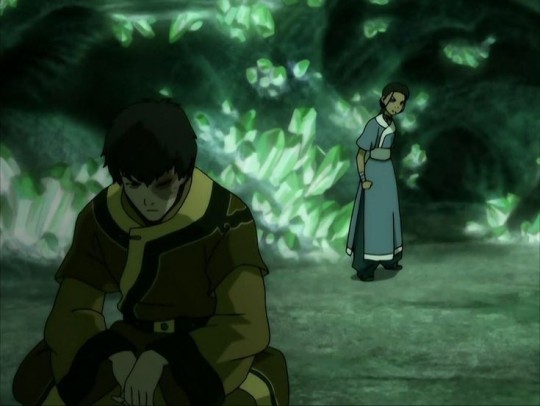
K: Why did they throw you in here? Oh, wait, let me guess. It's a trap. So that when Aang shows up to help me, you can finally have him in your little Fire Nation clutches!
K: You're a terrible person! You know that? Always following us! Hunting the Avatar! Trying to capture the world's last hope for peace! But what do you care? You're the Fire Lord's son. Spreading war and violence and hatred is in your blood!
Z: You don't know what you're talking about.
K: I don't? How dare you! You have no idea what this war has put me through! Me personally! The Fire Nation took my mother away from me.
here, zuko doesn't try to argue with katara until she implies that violence and aggression is an inherited thing, because he's from the fire nation. zuko accepts his mistakes but he is also aware that being a fire nation citizen or even royalty alone doesn't make you a bad person. even then, he doesn't raise his voice or lash out at her, he just calmly disagrees.
after katara mentions her mother, he apologizes and sympathizes with her.
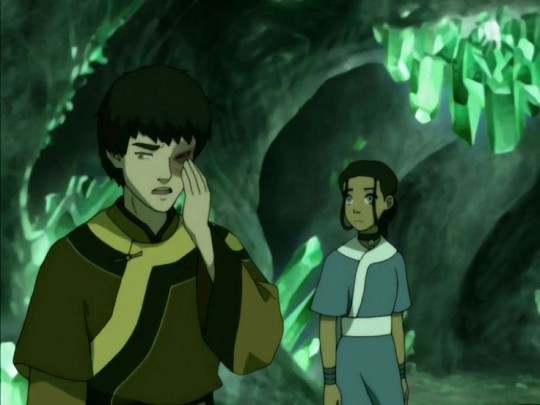
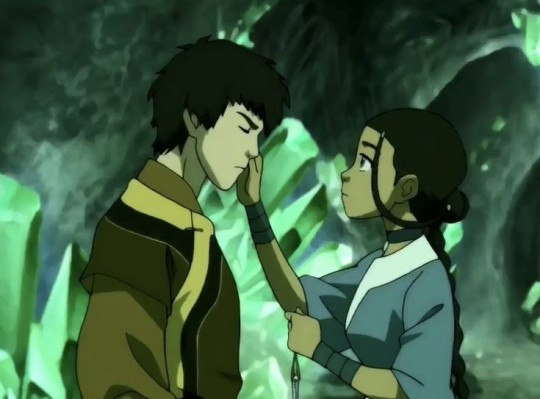
Z: I'm sorry. That's something we have in common.
K: I'm sorry I yelled at you before.
Z: It doesn't matter.
K: It's just that for so long now, whenever I would imagine the face of the enemy, it was your face.
katara also apologizes but zuko understands that it was completely in her right to blame him. and then we get to the crux of the issue. katara's mother was killed years ago but she still hasn't been able to move on from the grief.
now, of course, zuko again turns back to villainy but this was an important confrontation. and it wasn't the only one. as you all know, after zuko's official redemption, the gaang still doesn't trust him and katara is the last person to forgive him. she is still upset and disappointed by the way he betrayed her after they had begun to bond in the catacombs. and zuko has to prove his loyalty before katara could forgive him.
now let's come to glimmer and catra. catra DIRECTLY caused the death of glimmer's mother. and it was recent. glimmer had been grappling with her grief in the last season, to the point where she spirals into a small corruption arc. s4 of spop does NOT forget angella's death.
so obviously, you would expect there to be a confrontation between glimmer and catra in s5, especially since they were alone together in a confined space. but let's see what happened.
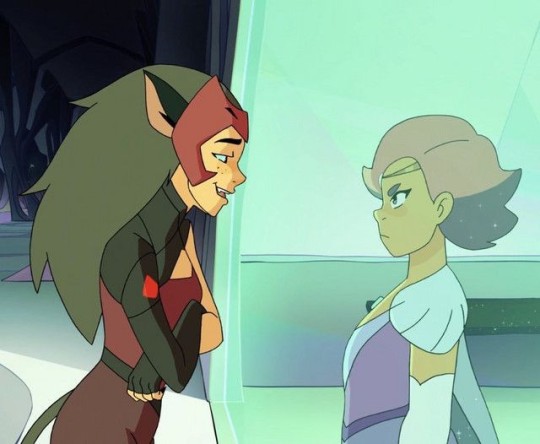
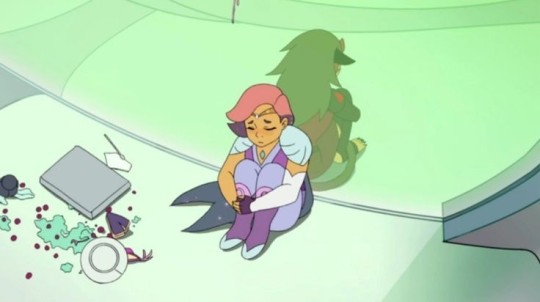
Glimmer: You again. Why do you keep coming back here?
Catra: Just...bored, I guess.
Glimmer: No, I mean, Horde Prime told you not to talk to me. He's gonna catch you eventually. Why risk it? ...You're lonely, aren't you?
so far, no confrontation, no apology.
Catra: What do you know? You're the prisoner here. I can go where I want. So, stay here by yourself for all I care.
Glimmer: Okay, okay, you're right. It...helps having someone to talk to. Even if you're the last person I'd ever want to be stuck here with.
Catra: Trust me, Sparkles, the feeling is mutual.
and just like that, they're on better terms now. glimmer doesn't bring up angella's death, she doesn't bring up the way catra treated adora, how she and bow were kidnapped by catra, nothing. they seem more like casual rivals than enemies here. catra doesn't seem guilty in the slightest, she just has to threaten to leave and glimmer immediately makes her stay.
and not just that, they joke about adora's paranoia that was rooted in her trauma, as if it's just a fun quirk. at this point, it's clear that the writers are not even trying to make it seem like they don't favor catra over all the characters.
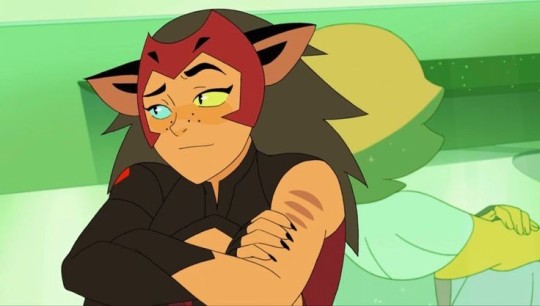
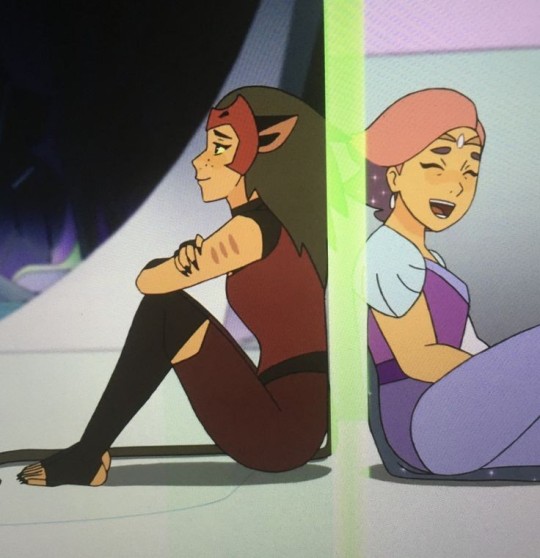
and the one time glimmer somewhat confronts catra—
G: Please, Catra. Do one good thing in your life!
C: Don't talk to me like you know me! You don't know anything about me!
of course, catra shuts her down immediately. and afterwards, even when catra saves glimmer, she makes it clear that she's only doing it for adora. while on the surface, this might still come off as a good deed, it's clear from her later behaviour that catra's goal wasn't to help either adora or glimmer. my best guess is that she was practically awaiting death at that point and didn't expect to face the consequences of her actions, so she wanted to go out with one good deed, much like shadow weaver.
it's crazy how zuko, who was just an antagonist and has done very little to directly hurt the gaang, faced the consequences of his actions and got a drawn out and detailed redemption; while catra, who spent the entire series hurting the protagonists out of her own interest, gets off scot-free.
any time her past actions are brought up, they are mentioned in the vaguest terms possible i.e. “she made some mistakes” or “shs hurt people”. it's so clear that the writers were hoping that if the other characters forgot everything that catra did, the audience would do the same. and the worst part is that they're right. 90% of the fandom were willing to accept catra's redemption because no one in the show ever holds her accountable or confronts her properly.
#spop critical#spop#spop salt#spop criticism#spop discourse#she ra#anti catradora#anti catra#anti spop#anti c//a#antic//a#anticatra#anticatradora
82 notes
·
View notes
Text
So while rewatching the live action trailer a 50th time i kind of started thinking about something.
There's a few moments in atla that always seemed untouchable to me. Not only because they were well executed when it comes to storytelling, but also bc we never actually see the moments in question. Examples are: the attack on the air temples, Ozai burning Zuko, Katara's mother's death. We hear about these from other characters who happened to be there, or in case of the air temples: we hear the moment being retold as history. It's the latter i want to expand on.
The original cartoon never shows us even a glimpse of the attack on the air temples. You could say "well it's a kid's show they can't show a brutal genocide" but honestly, we're talking about a cartoon that showed a skeleton on screen in the third episode, showed the main character getting electrocuted and plummeting to his death, and showed a man being drowned by a spirit. The reason they didn't show it imo, is because it makes sense for the narrative. This attack was a century ago. Everyone that witnessed the attacks and was old enough to remember them is dead. Bumi is the only person we know of that was alive at the time and old enough to somewhat remember, but he wasn't present. It's comparable to world war one for us. There's nobody alive currently that properly remembers WW1. We're being told about it in history class, we get shown those weird black and white videos of smiling soldiers on their way to their death, pushing carts through the mud, them shooting a few canons, the trenches etc. But there's no first hand recollections. The creators really drove home the point of the airbender genocide being ancient history to the current inhabitants of this world by never showing us the attacks itself, and only having it be a known historical fact. It's just something that happened, it was long ago, nobody remembers it. All they know is there's no more airbenders, they're extinct, and nobody remembers jack shit about airnomad culture and philosophy except those that study it (aka professor zei) and even then, it's based off of destroyed architecture and hard to find historical texts that i'm sure the Fire Nation tried their best to erase. The viewers of the show only get information about air nomads through Aang, and whatever flashbacks from his own memory he provides. It leaves us wanting to know more, and it feels extra tragic knowing we'll only have Aang to rely on to tell us the tales of his people (for atla specifically, i know we now have more info due to the avatar novels).
Netflix however, literally opens their trailer with three shots of the attack. The comet, then the fireballs being shot, then the firebenders and airbenders facing off. I don't like this decision to show the battle that took place, because then the point of it being ancient gets a bit lost. We as the audience get more information than the main characters have, and idk but to me that kind of ruins the experience?
Same with Zuko getting his scar. Not only are they gonna show us that, they put it in the trailer. Why? This is a very important character moment in the show that we don't even get to see bc it's told from Iroh's perspective and he looked away the moment it happened. Before this we were given crumbs as to how Zuko got his scar. And Netflix is just tossing it our way like Peeta tossed bread at Katniss Everdeen.
I might feel differently abt this when the show airs (although not likely lol) but currently i'm just kind of mad at these creative decisions being made man
77 notes
·
View notes
Note
Why do you think RWBY v1-3 worked compared to the rest of it?
Hm.
Honestly a lot of the first three volumes doesn't - the pacing can be awful (and grinds to a halt within arcs dealing with Jaune), the writing decisions leave a lot of to be desired(and are beyond offensive at times).
To say what the first three volumes do well is to talk about what the volumes after dont.
The issue with V4 and onward is simple one:
Too many new redundant characters
I have been hammering on this point again and again - in a weird attempt to expand the world, the showrunners ended up filling it with things that overlap win purpose or outright have no purpose.
Generally if you want to have something happen and want to choose between existing character and new character as initiator, nine times out of ten it's better to go with an existing character.
For example, why did we need Salem's evil council of evil? Why did we need a whole team of villains on Salem's side that essentially fulfill same role and purpose as Cinder's group already did? They don't exactly do anything for the lore or the setting and most of their purpose is one-note - Hazel for example exists just to rage about Ozpin in a poorly executed attempt at making his intentions and role more ambiguous - but there are already plenty of characters who can fill that purpose, so why was Hazel, as a character made? Raven exists, Ironwood exists and is clearly having a crisis, even Haven's headmaster exists (let's say he does) - plenty of ways other characters can fulfill the same purpose as Hazel without Hazel existing. Same extends to the rest of Salem's group - Watts exists solely to "explain" the computer virus (why did we need it explained?) and to have a reason to go against Atlas (but Cinder already has a reason thanks to her backstory in-show???) and Tyrian is the same way.
Too many redundant story beats
The writing attempted to make the setting more complex, but in the end a lot of what's added has no real reason to be there - why do we need Relics when Maidens are already there? Even if we were to go with the same idea of Gods causing doomsday(as dumb as it is) the writing could just as easily have the exact same plotline with collecting Maiden powers, for example. So why have vaults and then relics on top of that?
The Gods are the same way too. Why have Gods at all when you can already comfortably just go with the idea of Salem getting Maidens powers to her side being just as catastrophic? Salem's backstory doesn't even need them - in fact if one were to remove the Gods and keep the backstory the same, the end result would be exact same story. But the show doesn't do that - instead, come V9, it adds ANOTHER layer of gods and magic trees and gives the god brothers a backstory that ALSO wasn't needed and doesn't do ANYTHING in terms of furthering the narrative.
Generally if there's a plot thread you'd want to do the first question to ask would be "Does this change ANYTHING for any of the characters?" - plot is an excuse to get characters through the story beats after all. In the case of God Brothers, the plot thread invents a new problem and then solves it - nothing changes.
Lost Focus
The show is titled RWBY for a reason.
Ruby, Weiss, Blake, Yang - that's the core of the show.
The show started with the color trailers focusing on them and their journeys. The Volume 3 ended with them each having their own issues to deal with and plot threads tying to those issues.
What do the Volumes that follow do with that set-up? Nothing.
Volume 4 is absolutely pointless in grand scheme of things.
Volume 5 is absolutely pointless in grand scheme of things.
Volume 6 is absolutely pointless in grand scheme of things.
In fact, I wrote about the story structure issues with V4 years ago
The narrative structure, at the basic level, is a game of Connect-the-Dots - you have specific story beats you want to reach that work in accordance with overall story and character outline - it's up for The Plot(tm) to lead the characters from one beat to the other.
The way RWBY works past V3 is by inventing a new problem that didn't and then resolving it, essentially staying in place. I sort of outlined it in the V4 structure chart in my write up in how nothing in that Volume serves any real purpose nor furthers the characters.
What does the mess at Haven Academy contribute to the story story that Beacon already haven't? Does what happen there affect the story going forward? No.
What does team RWBY and the whole absolutely dumb and boring mess with the mech and leviathan do for the story? Are there any lasting consequences from that happening? Nope.
What does the run-in with the Apathy do for the characterization? Are there any lingering psychological effects? Do we learn something new about how Grimm function or how the Eyes work? Are there any lingering implications or any story holes that the encounter slots in into? Absolutely nothing.
That's three big examples in those Volumes where the writing invents a new issue, resolves it and doesn't further characters or narrative by doing so.
In Connect-the-Dots, you don't stop hopping from dot to dot midway-through, you don't hop back and forth between existing dots. Story beats and character beats are beats for a reason - they move things forward, they affect things, they alter things. If you have something that leads the narrative back at the place it was before in then you might as well delete the entire thing.
Now this is not the same as characters being stuck in loops or the idea of repetition as storytelling device - repetition that the narrative is aware of WOULD be a story beat in on itself and this is not that.
In fact even going into Atlas arc - the endgame has almost nothing to do with the build up to it and would happen anyway even if most of the volumes leading to it were removed.
Anticlimactic Payoff
If the narrative is build up to something, the pay off should generally equal to the amount of time and focus spend on the build up (unless it's used as a contrast).
Yet in RWBY a lot of mysteries end up being more of matter-of-fact answers than revelations.
What happened to the moon? Oh something crashed into it.
Why are Ozpin and Salem the way they are? Gods did it.
Why is Raven angry at Ozpin? He...turned her into a bird?
What has been Raven up to? Nothing.
Is Ozpin shady or not? Eh, not really - he's just sort of there.
What's up with the creatures of Grimm? Gods did it.
All of these were teased and built up going forward and the actual revelations never justified the build up or teasing that came before.
None of those revelations did anything to further the narrative or develop characters.
It was as if the writers were going through a checklist of what needs to be revealed.
So, What about the first three Volumes?
Now, flip everything I wrote about V4 and onward upside down.
That's the first three Volumes.
The only characters that exist are the ones that have an use within the narrative.
The plot threads are revealed when they become relevant - Mt.Glenn comes up when it matters, for example. If anything there's not enough reveals.
One can easily trace the plot threads through the story - how Ruby's introduction to Beacon affects her dynamics with Weiss, how Jaune's and Ruby's struggles with unexpected positions of leadership affect the team formation, how the friction within the teams furthers the plot to crash into villains goals. And what's more - each mini-arc ties to the four leads and their characterization. Things don't just happen - each storyline starts with the character and ends with characters growing or their relationships changing.
The Payoff is extremely good - V3 takes every single thing the show did through the three volumes and makes use of it. Everything matters - Mt. Glenn exposition, Roman, WF stuff, Jaune's insecurities, Pyrrha's characterization, Yang's characterization, Blake's conflict, Ruby's growth and position int he story, Weiss growth, etc - everything gets used and everything affects the characters involved.
For all the flaws, for all the absolutely insensitive story decisions and bad jokes - the first three volumes manage to handle those key points well and the end result is far more enjoyable.
The volumes after don't.
While good action sequences helped one of many reasons I hold V1 through V3 dear to my heart is because the show pulled off something that was quite rare back then when those Volumes aired - delivering actual consequences and not being afraid of upsetting the status quo within the story.
40 notes
·
View notes